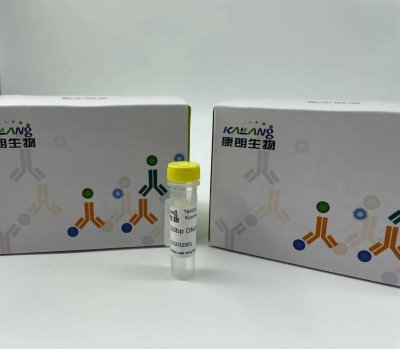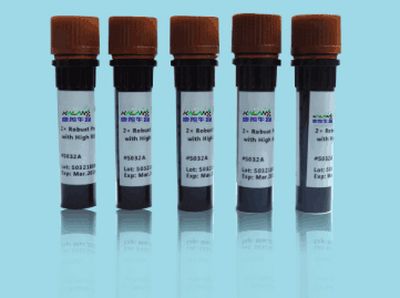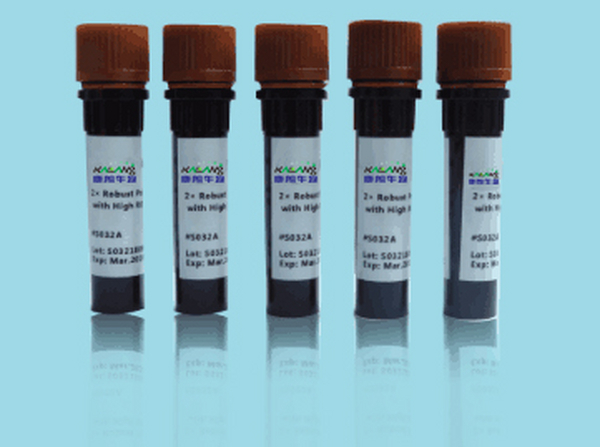QQ:3002763590


客服电话:021-61998208
UB2G2 rabbit Polyclonal Antibody
UB2G2抗体
UB2G2抗体应用:WB 1:500-2000 ELISA 1:5000-20000ubiquitin conjugating enzyme E2 G2(UBE2G2) Homo sapiens The modification of proteins with ubiquitin is an important cellular mechanism for targeting abnormal or short-lived proteins for degradation. Ubiquitination involves at least three classes of enzymes: ubiquitin-activating enzymes, or E1s, ubiquitin-conjugating enzymes, or E2s, and ubiquitin-protein ligases, or E3s. This gene encodes a member of the E2 ubiquitin-conjugating enzyme family. The encoded protein shares 100% sequence identity with the mouse counterpart. This gene is ubiquitously expressed, with high expression seen in adult muscle. Three alternatively spliced transcript variants encoding distinct isoforms have been found for this gene. [provided by RefSeq, Jan 2011],
UB2L3 rabbit Polyclonal Antibody
UB2L3抗体
UB2L3抗体应用:WB 1:500-2000 ELISA 1:5000-20000ubiquitin conjugating enzyme E2 L3(UBE2L3) Homo sapiens The modification of proteins with ubiquitin is an important cellular mechanism for targeting abnormal or short-lived proteins for degradation. Ubiquitination involves at least three classes of enzymes: ubiquitin-activating enzymes (E1s), ubiquitin-conjugating enzymes (E2s) and ubiquitin-protein ligases (E3s). This gene encodes a member of the E2 ubiquitin-conjugating enzyme family. This enzyme is demonstrated to participate in the ubiquitination of p53, c-Fos, and the NF-kB precursor p105 in vitro. Several alternatively spliced transcript variants have been found for this gene. [provided by RefSeq, Sep 2009],
UB2L6 rabbit Polyclonal Antibody
UB2L6抗体
UB2L6抗体应用:WB 1:500-2000 ELISA 1:5000-20000ubiquitin conjugating enzyme E2 L6(UBE2L6) Homo sapiens The modification of proteins with ubiquitin is an important cellular mechanism for targeting abnormal or short-lived proteins for degradation. Ubiquitination involves at least three classes of enzymes: ubiquitin-activating enzymes (E1s), ubiquitin-conjugating enzymes (E2s) and ubiquitin-protein ligases (E3s). This gene encodes a member of the E2 ubiquitin-conjugating enzyme family. This enzyme is highly similar in primary structure to the enzyme encoded by the UBE2L3 gene. Two alternatively spliced transcript variants encoding distinct isoforms have been found for this gene. [provided by RefSeq, May 2011],
UB2Q1 rabbit Polyclonal Antibody
UB2Q1抗体
UB2Q1抗体应用:WB 1:500-2000 ELISA 1:5000-20000ubiquitin conjugating enzyme E2 Q1(UBE2Q1) Homo sapiens The modification of proteins with ubiquitin is an important cellular mechanism for targeting abnormal or short-lived proteins for degradation. Ubiquitination involves at least three classes of enzymes: ubiquitin-activating enzymes (E1s), ubiquitin-conjugating enzymes (E2s), and ubiquitin-protein ligases (E3s). This gene encodes a member of the E2 ubiquitin-conjugating enzyme family. The encoded protein is 98% identical to the mouse counterpart. [provided by RefSeq, Jul 2008],
UB2Q2 rabbit Polyclonal Antibody
UB2Q2抗体
UB2Q2抗体应用:WB 1:500-2000 ELISA 1:5000-20000catalytic activity:ATP + ubiquitin + protein lysine = AMP + diphosphate + protein N-ubiquityllysine.,function:Catalyzes the covalent attachment of ubiquitin to other proteins.,pathway:Protein modification; protein ubiquitination.,similarity:Belongs to the ubiquitin-conjugating enzyme family.,tissue specificity:Detected in hypopharyngeal head and neck squamous cell carcinoma, in tumor masses and invasive epithelium.,
UB2R2 rabbit Polyclonal Antibody
UB2R2抗体
UB2R2抗体应用:WB 1:500-2000 ELISA 1:5000-20000ubiquitin conjugating enzyme E2 R2(UBE2R2) Homo sapiens Protein kinase CK2 is a ubiquitous and pleiotropic Ser/Thr protein kinase involved in cell growth and transformation. This gene encodes a protein similar to the E2 ubiquitin conjugating enzyme UBC3/CDC34. Studies suggest that CK2-dependent phosphorylation of this ubiquitin-conjugating enzyme functions by regulating beta-TrCP substrate recognition and induces its interaction with beta-TrCP, enhancing beta-catenin degradation. [provided by RefSeq, Jul 2008],
UBA6 rabbit Polyclonal Antibody
UBA6抗体
UBA6抗体应用:WB 1:500-2000 ELISA 1:5000-20000ubiquitin like modifier activating enzyme 6(UBA6) Homo sapiens Modification of proteins with ubiquitin (UBB; MIM 191339) or ubiquitin-like proteins controls many signaling networks and requires a ubiquitin-activating enzyme (E1), a ubiquitin conjugating enzyme (E2), and a ubiquitin protein ligase (E3). UBE1L2 is an E1 enzyme that initiates the activation and conjugation of ubiquitin-like proteins (Jin et al., 2007 [PubMed 17597759]).[supplied by OMIM, Mar 2008],
UBAP1 rabbit Polyclonal Antibody
UBAP1抗体
UBAP1抗体应用:WB 1:500-2000 ELISA 1:5000-20000ubiquitin associated protein 1(UBAP1) Homo sapiens This gene is a member of the UBA domain family, whose members include proteins having connections to ubiquitin and the ubiquitination pathway. The ubiquitin associated domain is thought to be a non-covalent ubiquitin binding domain consisting of a compact three helix bundle. This particular protein originates from a gene locus in a refined region on chromosome 9 undergoing loss of heterozygosity in nasopharyngeal carcinoma (NPC). Taking into account its cytogenetic location, this UBA domain family member is being studies as a putative target for mutation in nasopharyngeal carcinomas. Multiple alternatively spliced transcript variants encoding different isoforms have been found for this gene. [provided by RefSeq, Jan 2010],
UBAP2 rabbit Polyclonal Antibody
UBAP2抗体
UBAP2抗体应用:WB 1:500-2000 ELISA 1:5000-20000ubiquitin associated protein 2(UBAP2) Homo sapiens The protein encoded by this gene contains a UBA (ubiquitin associated) domain, which is characteristic of proteins that function in the ubiquitination pathway. This gene may show increased expression in the adrenal gland and lymphatic tissues. Alternative splicing results in multiple transcript variants. [provided by RefSeq, Sep 2013],
UBC rabbit Polyclonal Antibody
UBC抗体
UBC抗体应用:WB 1:500-2000 This gene represents a ubiquitin gene, ubiquitin C. The encoded protein is a polyubiquitin precursor. Conjugation of ubiquitin monomers or polymers can lead to various effects within a cell, depending on the residues to which ubiquitin is conjugated. Ubiquitination has been associated with protein degradation, DNA repair, cell cycle regulation, kinase modification, endocytosis, and regulation of other cell signaling pathways. [provided by RefSeq, Aug 2010],
最新动态
-

Anti-GNGT1 KL20092-001(50ul)
2021-10-11 -

Anti-GNGT1 antibody(50ul) KL20093-001
2021-10-11 -

MUC5AC (PT2058) mouse Monoclonal Antibody
2021-01-06 -

mOrange mouse Monoclonal Antibody(Mix)
2021-01-05
热门标签
- Histone H3 rabbit Polyclonal Antibody Histone H3抗体
- EGFR rabbit Polyclonal Antibody EGFR抗体
- Cy3 Conjugated
- AbFluor™ 555 Conjugated
- AbFluor™ 680 Conjugated
- AbFluor™ 350 Conjugated
- AbFluor™ 647 Conjugated
- AbFluor™ 594 Conjugated
- AbFluor™ 405 Conjugated
- Cy5 Conjugated
- AbFluor™ 488 Conjugated
- Cyclophilin B抗体 Cyclophilin B Monoclonal Antibody(2B10)
- COX IV抗体 COX IV Monoclonal Antibody(6C8)
- PCNA抗体 PCNA Monoclonal Antibody(12D10)
- FAK rabbit Polyclonal Antibody FAK抗体
邮箱:3002763590@qq.com
电话:021-61998208

扫码关注微信公众号






